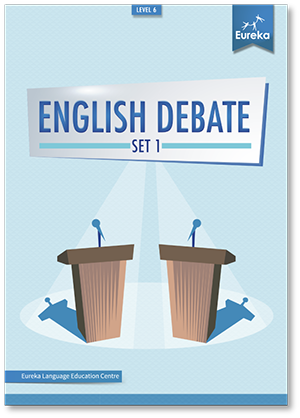
課程名: 英文辯論
級別: 小五 – 小六
上課堂數: 10 (建議)
課堂時數: 1 小時 30 分鐘 (建議)
導師: 具有大學學位的外籍英語導師;擁有相關教學經驗,和/或教學資格,如 TEFL、TESOL、CELTA、PGDE/PCEd 等等
課程目標
本課程旨在利用辯論來培養學生的推理能力和綜合語言技能。 辯論需要超凡的口頭表達能力和邏輯推理能力,有助促進年輕學習者的認知發展。 我們希望鼓勵學生培養更好的表達能力和獨立思考能力,並具備分析不同議案的能力。 在本課程結束時,學生將能夠深入了解辯論,尤其是 NESTA 風格的辯論,自行進行辯論。
課程特色
本課程包括三個主要元素:辯論技巧、團隊合作和擴闊詞彙。 本課程涵蓋了當代有爭議的議題,包括現代奴隸制、虐待動物以及互聯網的正面和負面影響。
課程大綱
Unit 1: Introduction to Debate
-
- Warm-up game: True or false
- Healthy eating
- What is debate?
- Have an opinion
- Corner game
- Responses: Agree or disagree
- Are uniforms good for students?
- Interviews and surveys
Unit 2: Supporting your Opinion
-
- Warm-up game: Hot seat
- Explaining your opinion
– Trains versus planes
– Vocabulary exercise - Convincing reasons
- Compare and contrast
– The country versus the city - Giving reasons
Unit 3: Brainstorming & Debate Delivery Skills
-
- Warm-up game: World association
- Internet safety
- Brainstorming
- Brainstorm challenge
- Debate delivery
- Voice
- Voice game
- Suggested debate topics
Unit 4: Supporting your Opinion with Evidence & Research
-
- Warm-up game: If I had one million dollars
- Defining motions
- Building a foundation
- Types of supporting evidence
- Language structures for giving supports
- One, two, three game
- Researching & rewriting evidence
- Vocabulary game: Taboo
Unit 5: Introduction to NESTA Debate
-
- Debate setup
- Modern-day slavery
- Vocabulary exercise
- Defining slavery
- NESTA orientation: Watching a debate clip
- NESTA code of conduct
- Role-plays: Etiquettes and expectations
- Teamwork
- Team building game: Bomb!
Unit 6: Organising your Debate
-
- Warm-up game: The whisper game
- Speaker one: Debate introduction
- Organising your debate
- Signposts, reasons and supports
- Components of a debate introduction
- Strip speech competition
- Debate introduction practice
- Vocabulary exercise
Unit 7: Refuting Opinions and Challenging Supports
-
- Warm-up game: Pass the story
- Points of view
- Types of refutations
- Challenging supports
- Evaluating evidence
- Detective work: Asking questions
- Challenging supports task
Unit 8: Speech Debates
-
- Warm-up game: Categories
- Debate flow
- Brainstorming
- The Society for the Prevention of Cruelty to Animals (SPCA)
- Introduction and arguments
- Refutation and summation
- Speed debates
- Roles in a debate
Unit 9: Debate Preparation
-
- Warm-up compliments
- Debate preparation
- Research
– Resources
– Listing new vocabulary
– Listing important points - Brainstorming
- Introduction and arguments
- Refutation and summation
Unit 10: The Final Debate
-
- Warm-up game: Hot seat
- How to judge a debate
- Tips for debaters
- Final debate
- Giving feedback
- Course review
